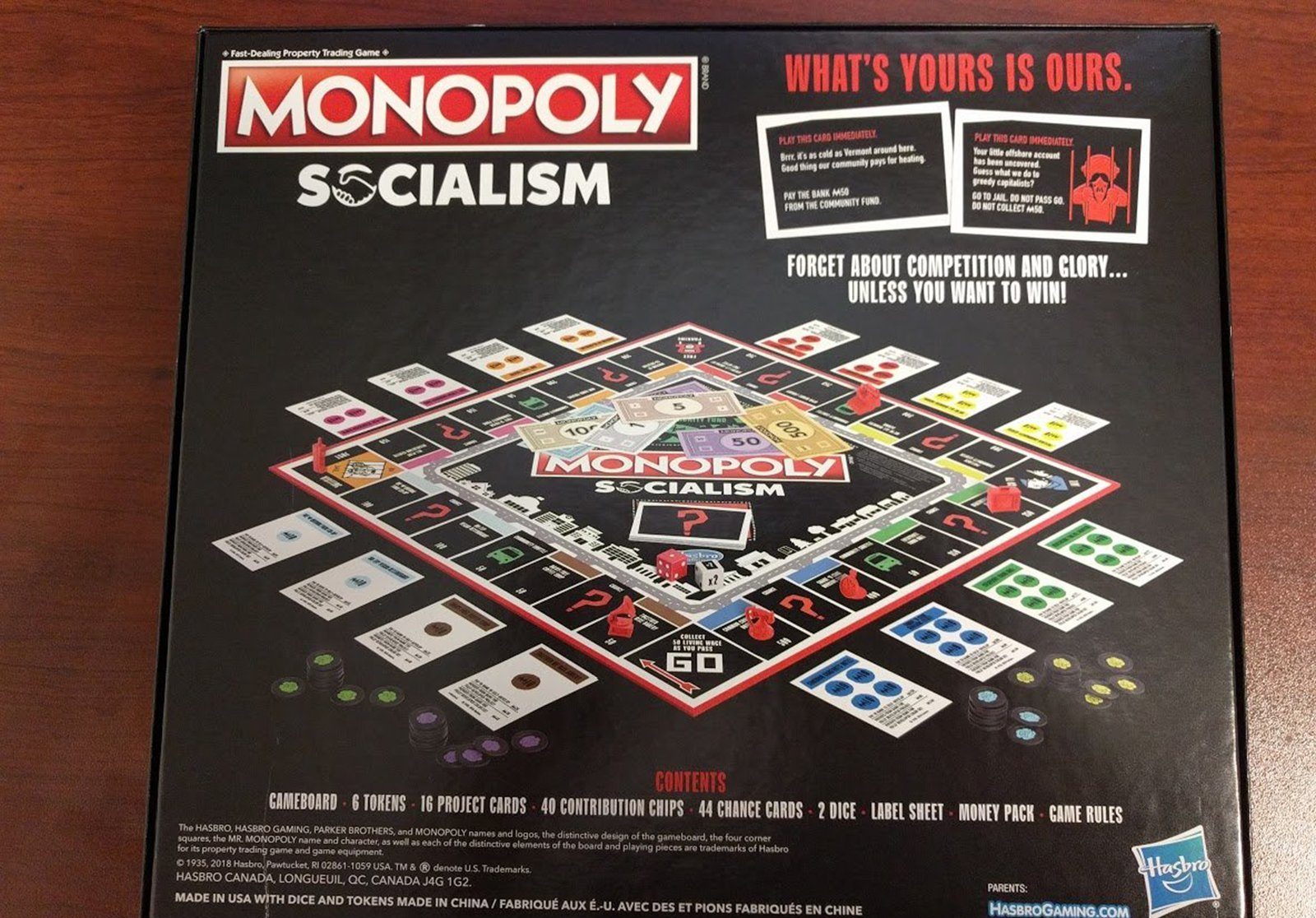
PAWTUCKET, R.I. — “Forget about competition and glory… Unless you want to win!”
That’s the message on the front of the box on a new edition of Monopoly that surfaced this week.
In Monopoly Socialism, an official version of the game manufactured by the toy company Hasbro, players move around the board contributing to community projects “unless they can steal projects to get ahead,” according to the product’s description.
When players pass go, they get a $50 “living wage” as opposed to the usual $200, and the tokens are all dated artifacts like a typewriter, a phonograph, a pocket watch, an old-fashioned telephone and an old-style TV set.
“Get ready for laughs as the twists and turns of life put a damper on working toward a shared, utopian society,” the description for Monopoly Socialism reads. “Cooperation isn’t always what it’s cracked up to be.”
But depending on where you are on the political spectrum, the tone of the game is either condescending or tongue-in-cheek. It sparked debate this week when a Twitter thread highlighting the version went viral.
The game pokes fun at the idea of working together, presenting it as ultimately incompatible with the selfish motivations of some players. Players are offered a series of choices that seem to highlight the potential for others to defect from “socialism.” They can either contribute to the community fund, or choose to deplete it. They can consider the best interest of the group, or do what is in their individual interest.
“Working together might seem ideal, but Chance Cards can abruptly shake things up with things such as lousy neighbors, vegan meatloaf and bad plumbing,” the description states.
It’s unclear how vegan meatloaf is a disruption to the social order, but it’s one of many references to veganism and health food in the game that seem to echo how the internet often loves to make fun of and/or hate on those things.
“Everyone loves the tofu-chip cookies you made in honor of Karl Marx’s birthday,” reads one of the cards. Another card mentions the “homemade granola you brought for lunch.”
Kapur said he doesn’t describe himself as a socialist, though he said his politics are left of center. But as someone who studies the 1960s and student protest movements, he said the game misunderstands the theory.
“Obviously, there are critiques of socialism and people can say maybe the market is better at delivering certain types of services than the government,” Nick Kapur, an assistant professor of history at Rutgers University, said. “But this game didn’t seem to be talking in those terms at all, it just seemed to be saying that ‘Socialism is bad, it makes you poor, you gotta give your money away constantly.'”
The game has ignited outrage from people across the political spectrum, from those who generally agree with Kapur’s observations to US Sen. Ted Cruz of Texas, who criticized Kapur in a thread of his own.
“Why to [sic] Leftie academics so fear pointing out the manifest failures of socialism?” Cruz wrote on Twitter.
While the board game was available online at Target as of Thursday afternoon, it now appears to have been removed from Target’s website. The link for the product now directs the user to a page that reads “Product not available.”
Hasbro has not responded to multiple requests for comment.
CNN has reached out to Target for comment.
Monopoly was originally invented to criticize capitalism
A Monopoly parody that makes fun of socialism might not seem all that unexpected.
In the most common version of Monopoly, players move around the board buying and trading properties, collecting rents and ultimately trying to force their opponents into bankruptcy.
But the woman who originally invented the game intended for it to be a lesson about wealth inequality, according to Mary Pilon, author of “The Monopolists: Obsession, Fury, and the Scandal Behind the World’s Favorite Board Game.”
Born in 1866, Elizabeth Magie often spoke out against the railroad, steel and oil monopolists of her time. In 1904, she invented and patented what she called “The Landlord’s Game.”
In the game, players circled the board buying up railroads, collecting money and paying rent. It had two sets of rules, one for “monopolists” and the other for “anti-monopolists,” to show how different approaches to property ownership could result in different social outcomes.
Pilon wrote in a 2015 article for Smithsonian.com that Magie’s game was initially sold by a New-York based publisher, but homemade versions of it spread throughout the Northeast.
Eventually, she writes, a man named Charles Darrow copied a version of the game and sold it to Parker Brothers in 1935. Magie sold her patent to Parker Brothers the same year, thinking that more people would now get to learn about economic inequality. But it didn’t exactly work out that way.
“Monopoly became a hit, selling 278,000 copies in its first year and more than 1,750,000 the next,” Pilon wrote. “But the game lost its connection to Magie and her critique of American greed, and instead came to mean pretty much the opposite of what she’d hoped.”

